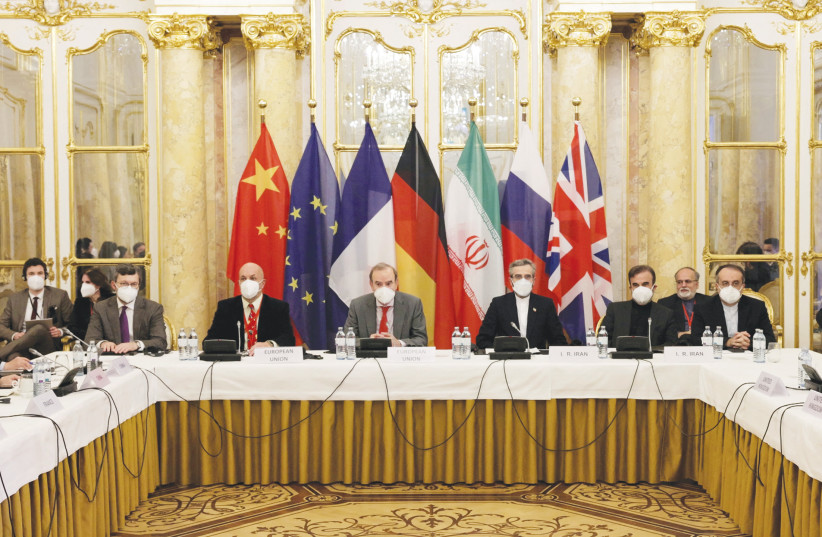The issues of the constantly-shifting timeframe and the lack of action taken by the US and EU have underwhelmed the West’s response to Iran.

A tipping point has been reached in the nuclear negotiations with Iran.
There are two problems with the tipping point: The first is that the timeframe keeps shifting, the second is that neither the US nor the EU is willing to take any real action that would inconvenience the Islamic Republic of Iran much more than the existing sanctions which it has managed to weather for nearly four years.
The first time that US chief negotiator Rob Malley said that Iran had only “weeks or months” to come back to the negotiating table, he quickly corrected himself to just “weeks.” That was in October. Iran did come back to the negotiating table in late November.
On December 17, EU envoy Enrique Mora told the press: “We don’t have months, we rather have weeks to have an agreement.” A week later, US National Security Advisor Jake Sullivan came through Israel and repeated the “weeks” as opposed to months formula, tossing out late January as a deadline.
Late January has passed. Already into January, Western diplomats started leaking early February as the deadline as opposed to late January.

In recent days, these same diplomats talked about the IAEA report in mid-February as a deadline – while stretching it out to include the March 7 meeting of the IAEA Board of Governors.
The question is, why should Tehran respect these deadlines if the West itself does not?
Moreover, the second issue – that the West has no real “Plan B” – hovers as an even greater barrier to changing the ayatollahs’ behavior. Israel has not helped.
Of course, Jerusalem said it is not bound by a deal and will act independently, but according to various leaks about preparation time, there is no real threat on the table any closer than several months away.
On December 29, Russia went as far as to say that it would not matter if Iran crossed the 90% weaponized uranium nuclear threshold because there would be more time until it could actually detonate and deliver a nuclear weapon.
If so, what real pressure will Moscow allow to be directed towards Iran simply because of a Western self-imposed deadline in either January, February or March?
In fact, all that Iranian Supreme Leader Ayatollah Ali Khamenei probably needs to give the West is some kind of advancement or progress.
If Khamenei finally agrees to hold direct talks with the US, this could buy several more weeks or even a few more months to avoid condemnation from the IAE Board on March 7. Or, if a deal is reached for the return of some or all of the hostages Iran is holding, this could also serve as an excuse that progress is being made and to extend the deadline.
The slightly better option for the US would be an interim deal where the Islamic Republic freezes its uranium enrichment or at least at the high 60% level in exchange for partial sanctions relief.
Until now, Tehran has rejected this idea, but maybe it will end up agreeing to it to drag out negotiations so that it will have more time to study its recent advances and conceal them more effectively.
Or, there is no deal, in which case nothing would really change other than some increased nominal sanctions and pressure from the US.
It will probably be months before the UN Security Council would vote on global snapback sanctions and any positive indication from Iran before then would probably delay dropping the hammer.
Meanwhile, Prime Minister Naftali Bennett and most of the Israeli defense establishment do not seem anywhere close to a major preemptive strike.
Maybe some more Iranian nuclear facilities might happen to blow up or scientists might get assassinated, but all such efforts only kick the can down the road.
Even a “full return” to the 2015 deal does not buy much time since key aspects of it are due to expire in 2025.
The latest tipping point will likely not be much of a game-changer as much as the latest new round, in a marathon that will go on for months and years to come until one side or another is finally ready to go to the mat.
Content retrieved from: https://www.jpost.com/middle-east/article-695009.